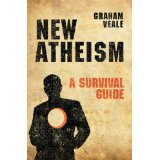What do I think of Mitch Stokes’s book published by Crossway? Let’s plunge into the Deeper Waters and find out.
Many atheists have long said it is time to move past religion. We need to be people of reason and evidence. (As if in all the history of religion no one ever thought about those) Once we don’t act so gullible and accept these religious beliefs, we will instead find some beliefs that stand up to scrutiny. We will see science bringing us into a brave new world.
Or will we?
Now to be fair, not all atheists have fallen for the myth of scientism, but a good deal have. They will not fall for the beliefs put out by religious people. (Although speaking historically, they will be gullible with regard to the existence of Jesus and believe the Christ myth theory wholeheartedly quite often) They believe in following the evidence where it leads.
Stokes challenges that and he does that by suggesting the atheists apply their skepticism and standards to the science they love so much. The book is divided into two parts. Those are science and morality. In the first, Stokes looks at claims related to science and asks if it can really deliver the goods that we are often promised it will.
Now no doubt, we owe much good to science, but the problem with scientism is that it says all good is owed to science and only science can tell us the truth. Stokes relies largely on Hume pointing out that by scientific standards, you can’t detect basic ideas like even causality. You do not see cause taking place. You assume some connection that cannot be detected.
For instance, you see a brick fly through a window. You see the brick shattering the window and think that that means that the brick shattered the window. That makes sense, but does it follow? We could point out that Hume said that a stone falling when dropped 1,000 times does not mean that it is going to fall when dropped the next time. The same applies for the brick and the window.
Science can tell us about events that happen and can give us some functional truth, but can we know it’s ultimately true? We could all be brains in a vat after all. In fact, science does not give us ultimate and absolute knowledge as it can be overturned at any time. Sometimes, this is much harder to do as Stokes points out, looking at the work of Kuhn mainly.
In the end, it looks like science doesn’t deliver the good of absolute truth. In the end, the atheist needs to frankly say he doesn’t know Unfortunately, this also means for him that science cannot disprove God. Yes. It could be that new atheists proudly proclaiming the death of God with science are just wrong.
What about morality? Stokes starts off by dealing with the supposed claim that we are saying that atheists cannot be good people. Not at all. What is said is that this goodness is often assumed to be a given in the universe. Yet how can we detect goodness? How can we have a standard of it? Stokes points out that Harris regularly just begs the question in arguing for his theory. I did wish Stokes had quoted Ruse’s review here, but that did not happen.
To get to the point, in the end, Stokes argues that atheism doesn’t really have a coherent theory of morality yet and it will ultimately boil down to nihilism. Therefore, to be a consistent atheist, you will need to be doubtful of knowledge and need to be a moral nihilist.
Or could it be atheists just aren’t really being consistent? Of course, we could say none of us are fully consistent, but we need to ask more if it is the case that our beliefs are not consistent or if we are not consistent with them? There is a world of difference.
Stokes’s book is written on a lay-level, though it could be a little bit deep at times. Still, it does give food for thought and is something worth thinking about. I would like to see one coming out sometime on historical claims as well.
In Christ,
Nick Peters

